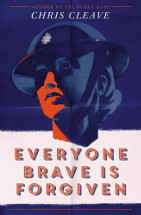Everyone brave is forgiven by Chris Cleave

Sceptre, 2016. ISBN 9781473618701
(Age: 16+) Highly recommended. When England declares war on Nazi
Germany, Mary North - a privileged young woman from an influential
family immediately offers her services to the War Office. Imagining
a posting in espionage, she is surprised to find herself assigned a
teaching role at a school in a poor area of London.
Education administrator Tom and art curator Alistair are best
friends who share a comfortably disordered flat until Alistair
enlists in the army and Tom is left feeling displaced and uneasy
after the change of circumstance.
Mary and Tom are brought together by her posting and a relationship
develops. Mary shows great character, throwing herself into her new
role, doing her utmost to teach and care for the unwanted and
disabled students left behind after their peers have been evacuated.
Tom struggles with his civilian status living in a city being
destroyed by endless bombing, whilst his best friend and most able
bodied men are in the services, fighting the Germans.
During the Dunkirk evacuation, Alistair proved himself to be a
highly competent Army officer who did his best to ensure the
survival and welfare of his men. His world view is dramatically
altered by the unimaginable violence of war and he feels
uncomfortable and insecure when catching up with Tom when on leave -
to meet his new girlfriend Mary and her best friend Dora.
The novel focuses closely on these characters and it is pleasing
that the familiar theme of Blitz ravaged England, starved by U-boats
and threatened by armies massing across the Channel, can once again
form a first rate, interesting tale. Jazz culture is one aspect
which is presented differently, with African American performers
being treated abominably by society whose ignorance and galling
arrogance produces a powerfully confronting style of racism.
Whilst this could be described as a romance, there is great depth in
terms of drama and historical detail which should make this appeal
to a wider readership. The war is seen to be a great leveller and
when aristocratic pretensions are stripped away, decent, likeable
and even heroic individuals emerge to do their best to help others
traumatised by the conflict.
Similarly, the siege and bombing of Malta - so extreme that it might
be considered bordering on exaggeration if it were not completely
true, is presented with great attention to detail. The reader
appreciates how brave and enduring the Maltese were in resisting an
unending attack under almost impossible conditions and how close the
allies came to losing the war.
This is an excellent book which suits readers 16+.
Rob Welsh